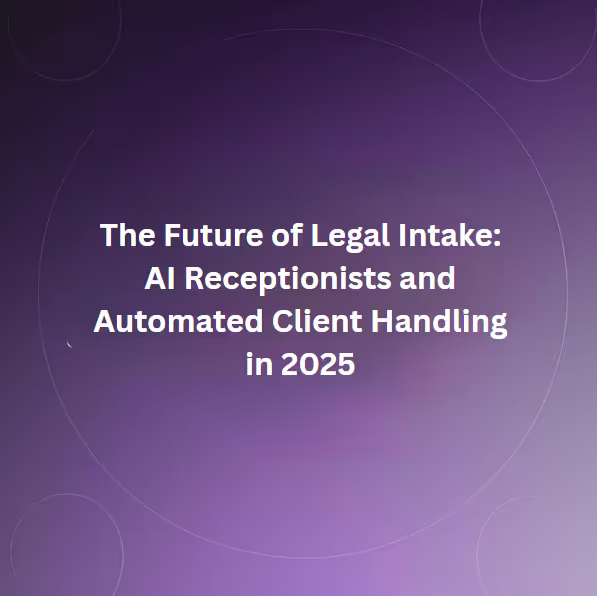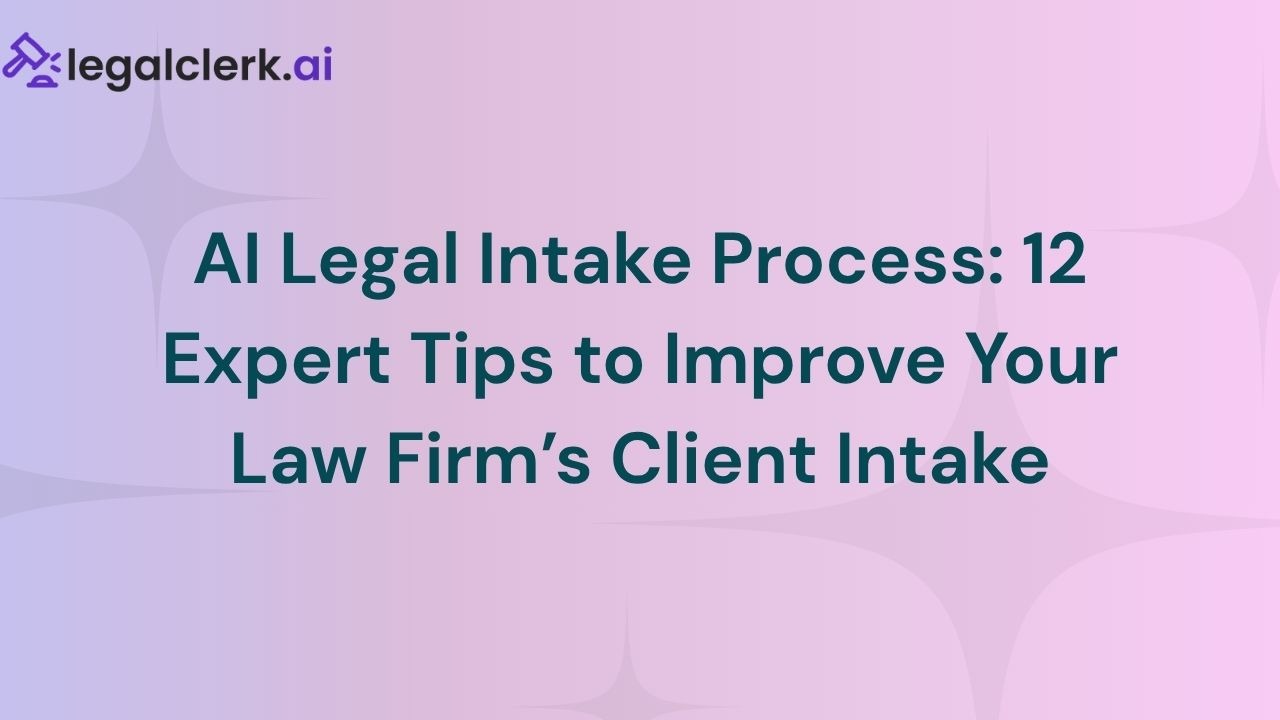The Future of Legal Intake: AI Receptionists and Automated Client Handling in 2025
This comprehensive blog explores how AI receptionists are transforming legal client intake in 2025. It covers the key benefits including 24/7 availability, improved conversion rates, and cost savings compared to traditional reception methods. The post addresses common concerns, provides real-world case studies, and offers practical implementation guidance for law firms considering this technology upgrade.

Law firms face a simple truth: first impressions matter. When potential clients call, they expect quick answers and professional service. Yet many firms struggle with intake management. Phone calls go unanswered. Clients wait on hold. Important details get missed.
AI receptionists are changing this reality. These smart systems handle client intake with precision and care. They never take breaks, never miss calls, and never forget to ask key questions.
What AI Receptionists Do for Law Firms
.avif)
AI receptionists work like skilled human assistants. They answer calls instantly. They ask the right questions. They schedule appointments. They even handle basic legal questions.
These systems learn your firm's specific needs. They understand legal terminology. They know which cases your firm takes and which ones you refer out.
When someone calls about a car accident, the AI knows to ask about injuries, insurance, and timeline. For divorce cases, it focuses on children, assets, and urgency. Each conversation follows a smart script designed for that practice area.
Key Benefits That Matter
Speed wins clients. People want help now. AI receptionists answer every call on the first ring. No busy signals. No voicemail. Just immediate, professional service.
Consistency builds trust. Human receptionists have good days and bad days. AI stays professional every time. It asks every important question. It records every detail accurately.
Cost savings add up. A full-time receptionist costs $35,000 to $50,000 per year plus benefits. AI systems cost a fraction of that amount. The savings fund other growth areas.
24/7 availability captures more leads. Legal emergencies happen at night and on weekends. AI receptionists work around the clock. They capture leads that would otherwise go to competitors.
How Client Intake Gets Better
Traditional intake involves phone tag, missed calls, and incomplete information. Clients get frustrated. Staff gets overwhelmed. Cases slip through cracks.
AI systems eliminate these problems. They gather complete information the first time. They instantly send details to the right attorney. They follow up automatically.
The process becomes smooth for everyone. Clients feel heard and understood. Staff focuses on complex work instead of basic questions. Attorneys get better case information from day one.
For a detailed comparison of different approaches, see our complete analysis of intake methods.
What Clients Experience
Sarah calls a personal injury firm after a car accident. The AI receptionist answers immediately.
"Thank you for calling Smith & Associates. I'm here to help with your legal needs. Can you tell me about your situation?"
Sarah explains her accident. The AI asks targeted questions about injuries, medical treatment, and insurance. It schedules her consultation for the next day. It sends her intake forms by email.
The entire process takes five minutes. Sarah feels confident she chose the right firm.
Compare this to her experience with another firm. She called twice. Both times, she got voicemail. When someone finally called back, they asked basic questions she already answered. The appointment took two weeks to schedule.
Which firm do you think Sarah chose?
Real Results from Early Adopters
Firms using AI receptionists report impressive changes. Call answer rates jump from 60% to 95%. Client satisfaction scores improve. New case conversion rates increase by 30% or more.
One personal injury firm in Texas saw dramatic results. Before AI, they missed 40% of incoming calls. After implementation, they captured nearly every lead. Their monthly case intake doubled.
A family law practice in California reduced intake time from 20 minutes to 8 minutes per call. Staff productivity increased. Client satisfaction scores reached all-time highs.
The numbers tell a clear story. But the real impact shows in daily operations. Staff stress drops. Client complaints disappear. Revenue grows steadily.
Common Myths About AI Receptionists
Some lawyers worry AI will sound robotic. Modern systems use natural speech patterns. Clients often cannot tell they are speaking with AI.
Others fear losing the personal touch. AI receptionists enhance human connection. They gather detailed information before attorneys meet clients. This preparation leads to more meaningful conversations.
Cost concerns also arise. Many firms worry about expensive technology. The reality is different. Most AI systems cost less than hiring part-time help.
Privacy fears persist too. Legal-specific AI systems meet strict security standards. They often provide better data protection than traditional methods.
Many firms also wonder about outsourcing versus AI solutions. Both have merits, but AI offers 24/7 consistency.
Challenges to Consider
AI receptionists work well but have limits. Complex legal questions still need human expertise. Emotional situations require empathy that AI cannot fully provide.
Integration takes planning. Staff needs training on new workflows. Existing phone systems may need updates. The transition requires careful management.
Privacy and security matter more in legal settings. AI systems must meet strict confidentiality standards. Data protection becomes critical.
Choosing the Right System
Not all AI receptionists work the same way. Look for systems designed specifically for law firms. They should understand legal terminology and common client needs.
Integration capabilities matter. The system should connect with your case management software. It should sync with your calendar. It should send data where you need it.
Customization options help match your firm's style. You want the AI to sound like your brand. It should ask questions that matter for your practice areas.
For specific provider comparisons, check out reviews of My AI Front Desk and Smith AI to see detailed feature breakdowns.
Implementation Best Practices
Start with a pilot program. Test the system with a limited number of calls. Monitor performance closely. Make adjustments before full rollout.
Train your staff thoroughly. They need to understand how the system works. They should know when to take over from the AI. Clear protocols prevent confusion.
Set realistic expectations. AI receptionists handle many tasks well. They cannot replace all human interaction. Define clear boundaries for what the system should and should not do.
Create backup plans. Technology sometimes fails. Staff should know how to handle calls manually. Have clear procedures for system downtime.
Monitor performance regularly. Track call answer rates. Measure client satisfaction. Review conversion statistics monthly. Use this data to improve the system.
Integration with Existing Systems
Modern AI receptionists connect with popular legal software. They sync with case management systems like Clio and MyCase. Calendar integration ensures accurate scheduling.
Document automation saves time. The AI creates intake forms automatically. It sends follow-up emails without staff intervention. Client information flows seamlessly through your workflow.
Payment processing becomes simpler too. Some systems handle retainer collection during the initial call. Clients can pay consultation fees before hanging up.
CRM integration tracks every interaction. You see complete client histories at a glance. Marketing efforts become more targeted and effective.
The Path Forward
AI receptionists represent the future of legal intake. They solve real problems that plague law firms today. Early adopters gain competitive advantages.
The technology will only improve. Natural language processing gets better. Integration becomes smoother. Costs continue falling.
Voice recognition accuracy now exceeds 95%. Multilingual support expands access to diverse communities. Mobile integration lets clients interact through text and chat.
Firms that embrace this change now position themselves for long-term success. They capture more leads. They serve clients better. They operate more efficiently.
Consider the alternative. Competitors adopt AI receptionists while you rely on outdated methods. They answer more calls. They convert more leads. They grow faster.
The choice becomes clear. Adapt or fall behind.
Making the Decision
Consider your current intake process. How many calls do you miss? How long do clients wait? How much time does staff spend on basic questions?
Calculate the real costs. A missed call could mean a lost $50,000 case. Poor intake experiences damage your reputation. Inefficient processes waste billable hours.
AI receptionists address these pain points directly. They create better experiences for clients and staff alike. The investment pays for itself through increased efficiency and higher conversion rates.
Start small if budget concerns exist. Many providers offer month-to-month plans. You can test the system without major commitments. Scale up as results prove the value.
The legal industry moves slowly toward new technology. Firms that act quickly gain lasting advantages. AI receptionists offer that opportunity today.
Your competitors will eventually adopt these tools. The question is whether you lead or follow. Early adoption means better market position and stronger client relationships.
Taking Action Today
Research available options. Schedule demos with different providers. Ask specific questions about your practice areas. Get references from similar firms.
Calculate potential returns. Estimate how many additional cases you could handle. Consider time savings for existing staff. Factor in improved client satisfaction scores.
Plan your implementation timeline. Allow for staff training. Budget for integration costs. Set measurable goals for success.
For comprehensive provider options, explore our guide to the top legal answering services and learn about enhancing client onboarding processes.
The future of legal intake is here. AI receptionists make it possible to answer every call, capture every lead, and serve every client with professional excellence. The firms that embrace this future will thrive in the years ahead.
Success in law requires excellent client service. AI receptionists ensure you deliver that service consistently. They handle the routine work so you can focus on practicing law.
Make the choice that positions your firm for growth. Embrace AI receptionists and transform your client intake process. Your clients will notice the difference. Your bottom line will too. Feel free to contact
Recent Blogs
FAQs: Everything You’re Wondering About Your AI Receptionist
Absolutely. Whether you need a full-time law firm answering service or just support during off-hours, LegalClerk adjusts to your needs. You control when the AI receptionist picks up.
Yes. LegalClerk is built specifically for law firms. It knows how to handle legal intake questions, understands terminology by practice area, and never misses a required field or form detail.
Yes. Our AI legal receptionist uses advanced natural language processing and human-like voice tech to deliver a warm, responsive client experience. Most callers can’t tell it is AI — and that’s by design.
Yes. LegalClerk connects with tools like Clio, Lawmatics, Google Calendar, Calendly, and more. New leads, appointments, and intake summaries are automatically synced.
Yes. LegalClerk offers multilingual legal receptionist support, allowing you to serve a broader range of clients with accurate, translated intake flows.
Completely. LegalClerk uses HIPAA-grade encryption, secure storage, and detailed access logging. Every call and submission is protected and fully auditable.

.avif)
3.jpg)


.jpg)